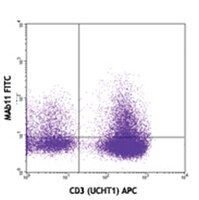Acute bronchial obstruction in sheep: histopathology and gland cytokine expression.
Robert A Cox, Ann S Burke, Gloria Oliveras, Perenlei Enkhbaatar, Lillian D Traber, Joseph B Zwischenberger, Marc G Jeschke, Frank C Schmalstieg, David N Herndon, Daniel L Traber, Hal K Hawkins
Experimental lung research
31
819-37
2005
Show Abstract
An ovine model of smoke inhalation and burn (S+B) injury models the pathophysiology of these injuries in humans. This study examines the degree of airway obstruction, associated histopathology, and bronchial gland cell expression of cytokines during the first 24 hours after S+B injury in sheep. Changes in the mean degree of obstruction were limited to the bronchial airways, showing significant increases in obstruction with time, P.05. At 4 hours after injury, the obstructive material was predominantly mucus, with neutrophils clustered around and within gland acini. At 8 to 24 hours, bronchial obstruction was characterized by increased inflammatory cell accumulation. Immunohistochemical results showed that gland cells constitutively express and secrete interleukin (IL)-1beta, and that after injury there is an increase in the percentage of gland cells staining for IL-1alpha, IL-8, and tumor necrosis factor (TNF)-alpha, P.05. | 16684715
 |
Monocyte-mediated drug-dependent cellular cytotoxicity: effects on different WEHI 164 target cell lines.
Austgulen, R, et al.
Cancer Immunol. Immunother., 22: 176-80 (1986)
1986
Show Abstract
The contribution of monocyte cytotoxic protein factor (CF) to monocyte-mediated drug-dependent cellular cytotoxicity (DDCC) has been investigated. Cell lines which have been derived from murine WEHI 164 cells (termed WEHI 164 parental) by selecting for high (WEHI 164 clone 3) and low (R-WEHI 164) sensitivity to CF-mediated cytotoxicity were used as target cells in DDCC. By comparing the CF doses which produced 50% dead cells (LD 50) we found that WEHI 164 clone 3 was approximately 30 times more sensitive than WEHI 164 parental which in turn was 70 times more sensitive than R-WEHI 164. Actinomycin D (Act D) treatment of WEHI 164 parental and R-WEHI 164 greatly increase susceptibility to CF-mediated cytotoxicity. The susceptibility of WEHI 164 clone 3 was apparently somewhat increased at low dilutions of CF, whereas no significant increase was observed at high dilutions. The susceptibility to DDCC of the three target cell lines (WEHI 164 parental, WEHI 164 clone 3, and R-WEHI 164) correlated with the sensitivity pattern obtained in CF-mediated cytotoxicity of Act D-treated target cells. Monocyte- and CF-mediated cytotoxicity against Act D-treated WEHI 164 clone 3 and R-WEHI 164 was inhibited by neutralizing CF antiserum. These data indicate that CF is an effector molecule in monocyte-mediated DDCC. | 3731202
 |

















